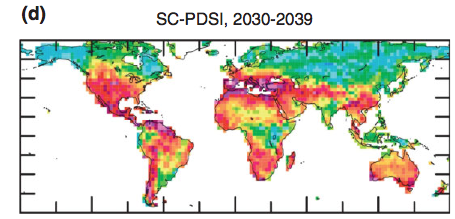Staniford on Denialism, Drought, and Politics
My latest man-crush is Stuart Staniford. He has a PhD in physics from UC Davis and is currently chief scientist for FireEye, a company that develops security software. As a hobby, though, he obsesses about longterm risks to humanity, and in his most-recent bloggy incarnation he writes Early Warning, which I just came across last week when Kevin Drum linked to it.
I don’t always do this when I come across a new blog, but in this case I’ve gone back to the beginning and am reading the whole thing in chronological order. It’s really good stuff. I enjoy following along as Staniford works his way through a problem; he’s logical, intelligent, and has a real knack for conveying the technical details of an issue in terms that neither overwhelm nor talk down to a non-technical reader.
Here’s one item I liked: The Elephant in the Room, in which he reviews the book of the same name. Staniford actually doesn’t think much of the book, but his comments on the subject itself are very cool:
When something is scary, people have an incentive to somehow avoid dealing with the facts, and a variety of creative strategies are available to them.
And in the alternative, if you commit yourself in some way to the idea that a particular risk is a big deal, (eg taking a public position, making career choices based on your assessment), you have a psychological incentive to deny evidence that maybe the problem is not so severe after all.
I think it’s these dueling incentives that create the structure we so often see around major global risks – one side is busy either ignoring the problem, or if that is no longer working, minimizing it, attacking the integrity of the proponents, etc. Meanwhile, the other side is at risk of exaggerating the seriousness of the problem, ignoring countervailing evidence or important context and of course attacking the integrity of the deniers. Both sides are often sincerely convinced of their own rightness (though there certainly can be scope for cynicism and deliberate dishonesty as well, and both sides will be very quick to point to the evidence for this on the other side, and very slow to examine it on their own side).
Staniford has a recent series of posts on the future of drought that were especially good. They basically concern his emotional and intellectual reactions to this graph:
It’s fascinating stuff. Staniford basically freaks out in response to seeing the graph and trying to wrap his head around what it means, then settles himself down and says, in effect, hey, I’m a scientist. I need to engage with this thing rationally. And then he does just that, and takes the reader along with him as he does his research and fits the pieces together. Highly recommended.
If a seven-part series of posts is too much of an investment, here’s a recent piece of Staniford’s that might pique the interest of this site’s readers in particular: A few election throughts.
What I see happening is this: the public is aware, rather inchoately, that things are going badly wrong and that the life they are accustomed to is under threat, but they have no idea what to do. The parties, by and large, have failed to diagnose the roots of the problem, and instead are reflexively proposing to relive their greatest hits of the past. Since the problems of the past are not the problems of the present, these approaches are not working. This is leading both parties into a cycle of over-promising what they can deliver, thus leading to bitter disappointment.
He goes on to detail just how it is that he sees the two major parties failing, and he doesn’t pull his punches. Like Jon Stewart talking to Rachel Maddow, the thing that strikes me the most, I think, is just how refreshing it is to read the take of someone who doesn’t feel the need to be throwing monkey poo at one side or the other, but is willing to stand back and say look: monkeys throwing poo.

